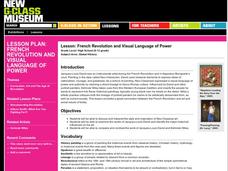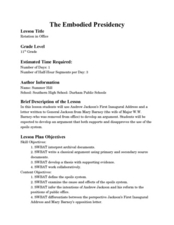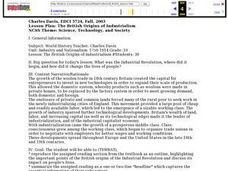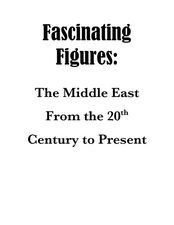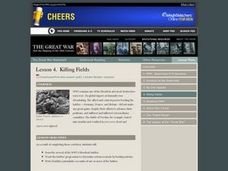National Endowment for the Humanities
David Walker vs. John Day: Two Nineteenth-Century Free Black Men
What was the most beneficial policy for nineteenth-century African Americans: to stay in the United States and work for freedom, or to immigrate to a new place and build a society elsewhere? Your young historians will construct an...
Constitutional Rights Foundation
History of Immigration Through the 1850s
Everyone living in the United States today is a descendant from an immigrant—even Native Americans. Learn about the tumultuous history of American immigration with a reading passage that discusses the ancient migration over the Bering...
Curated OER
"Shooting An Elephant": George Orwell's Essay on His Life in Burma
High school readers examine George Orwell's essay "Shooting an Elephant" for examples of symbolism, metaphor, connotation, and irony. They analyze how these literary tools convey the writer's main point and contribute to the persuasive...
National Endowment for the Humanities
Factory vs. Plantation in the North and South
North is to factory as South is to plantation—the perfect analogy for the economy that set up the Civil War! The first lesson in a series of five helps teach beginners why the economy creates a driving force for conflict. Analysis of...
Curated OER
In Search of Ethnic Identity in Selected Narratives: New Reading, New Meaning
Students read texts reflecting multiple cultural perspectives.
Curated OER
The Causes and Course of the First World War
Use this twelve-day lesson plan to teach about the causes and courses of WWI. Each day scholars attend lectures, complete creative activities, and hold round table discussions on what they've learned. Web links and resources are...
New Class Museum
Lesson: French Revolution and Visual Language of Power
Take a look at the French Revolution and neo-classic art, then compare it to current social issues and contemporary art. Kids analyze several pieces painted by Jacques-Louis David in regard to style and subject then compare them to...
Curated OER
Gandhi Speech Writing
Explore non-violent protest in this social values and world history lesson. After viewing the movie Gandhi, and discussing important events in Gandhi's life, young orators write a speech defending Gandhi's position on the value of...
Curated OER
THE OCCUPATION OF KOREA BY JAPANESE IMPERIALIST FORCES
Students read and respond to a history of Korea. In this occupation instructional activity, students work in groups to research the effects of Japanese occupation and create an illustrated timeline. Students listen to a lecture and write...
Curated OER
The Gettysburg Address by Abraham Lincoln
"The Gettysburg Address" is the basis of a series of activities that not only model for learners how to conduct a close reading of a text, but also how a close reading can help them comprehend a difficult text. The detailed, step-by-step...
National Park Service
The Power of Remembrance
On every July 4th, we watch fireworks and celebrate our independence, but how is the history of the American Revolution preserved? Four social studies lesson guide learners through different memorials, commemorative objects, and restored...
City University of New York
African Americans and the Populist Movement
Why did the Populist Party fail to ally itself with African American farmers? To answer this essential question, class members investigate the Populist Era (188-1900) and read an article written by Tom Watson, a Populist leader.
Curated OER
Rotation in Office
Eleventh graders explore the concept of the spoils system. In this presidential history lesson, 11th graders examine Andrew Jackson's Inaugural Address as well as a letter to him from Mary Barney in order to gain an understanding of the...
Curated OER
The French Revolution
Students understand the basic political events of the French Revolution, broken down into four stages, and the shifts of power during each stage. They examine how the members of the Third Estate gained not only political but also...
Curated OER
Why Kosovo? Why Now?
Students explain the establishment of the modern state of Yugoslavia and the breakup of the country. They examine the human characteristics of the region - ethnic groups, languages, and religions.
Curated OER
"Shooting An Elephant": George Orwell's Essay on his Life in Burma
Students read an essay by George Orwell's life in Burma and place it in its cultural and historical context. They identify the main points of the essay and Orwell's use of symbolism in the essay. They explain how each persuasive tool...
Curated OER
Jazz in America
Students learn vocabulary associated with the Swing Era. They also listen to music from the time period.
Curated OER
Colonialism/The Arab/Israeli Conflict
Investigate critical historical issues using primary source documents then gather and evaluate information regarding the Jewish and Arab claims to land in Israel. Learners use their findings to prepare detailed timelines of events during...
Curated OER
The British Origins of Industrialism
Tenth graders brainstorm the Industrial Revolution and how it changed the lives of people. They describe rural life in preindustrial Britain. They identify the factors that allowed Britian to become the first industrialized nations.
Curated OER
Fascinating Figures: The Middle East from the 20th Century to Present
Students examine the leaders of the Middle East. In this Middle East lesson, students read biographies regarding featured twentieth century leaders of Egypt, Israel, Iran, Iraq, Jordan, Libya, Syria, Tunisia, Turkey, and Yemen. Students...
Curated OER
The Star-Spangled Banner
Get your kids moving as they learn about the history of the United States National Anthem. Scholars examine the War of 1812, Francis Scott Key, and the meaning behind The Star Spangled Banner as they listen to an 18-minute...
Curated OER
Lesson 4. Killing Fields
Eleventh graders describe several of the WWI's bloodiest battles, track the battles' progression to determine advances made by leading nations, and write frontline journalistic accounts of one or more of the battles.
Curated OER
A World of Money
Learners explore the traditions related to the creation of national currencies. The role currency plays in shaping a national or regional identity and the influences that the designers of world currency exert are examined in this lesson.
Facing History and Ourselves
We and They, the Armenians in the Ottoman Empire
Learners examine World War I war crimes. For this world history instructional activity, learners use primary and secondary sources to research and understand the action taken by the United States during the Armenian Genocide. Learners...








